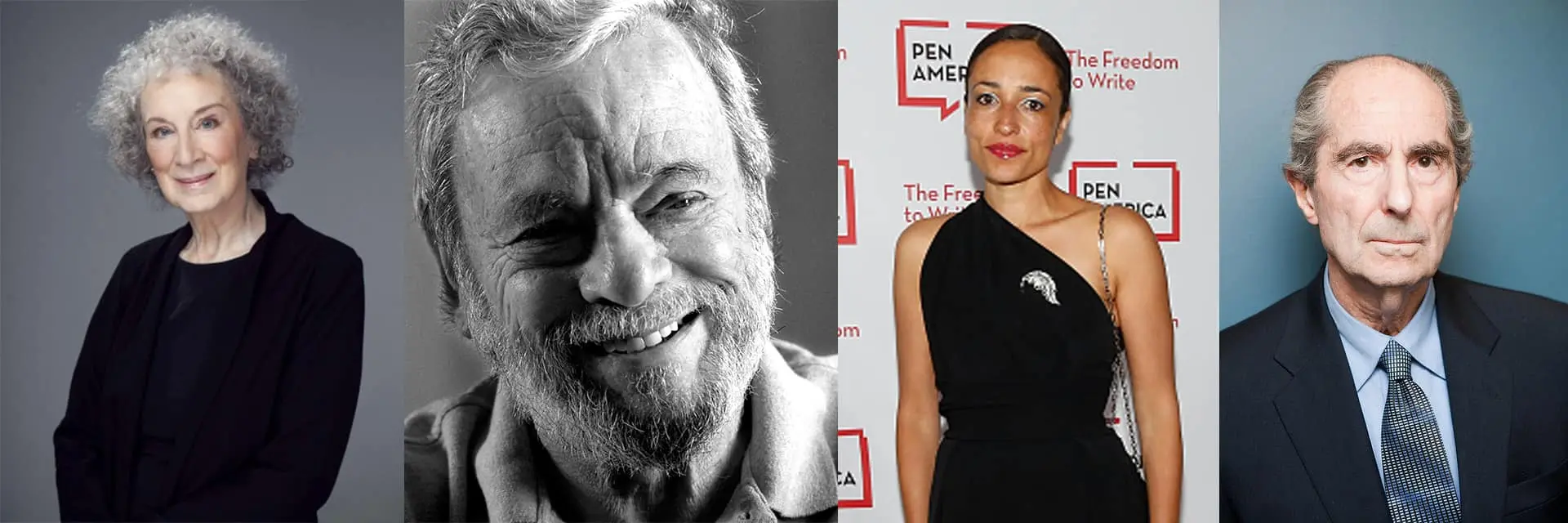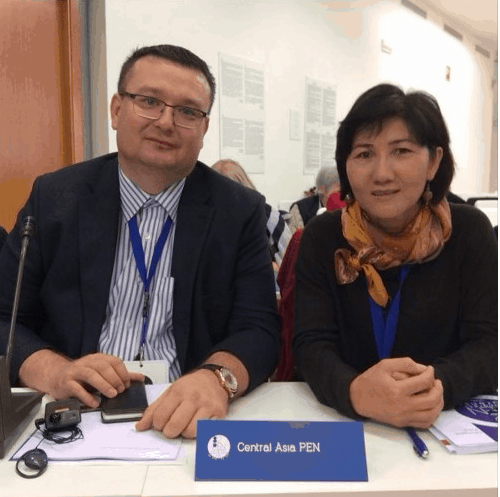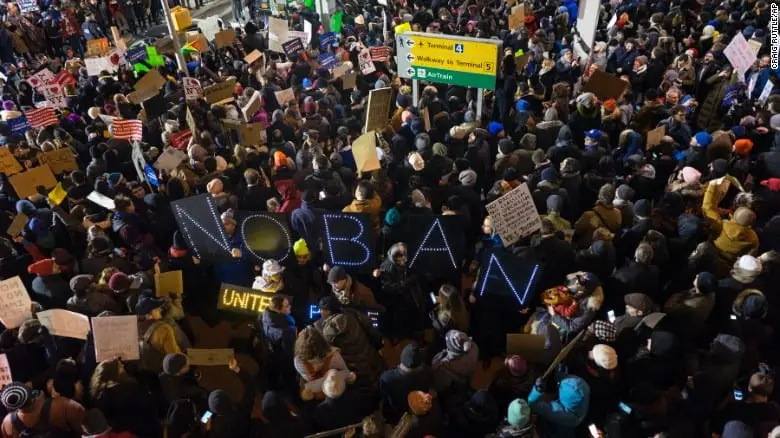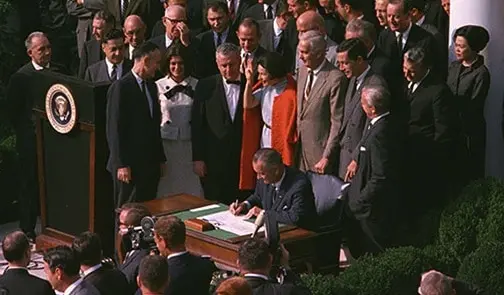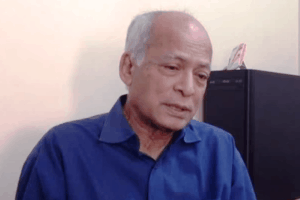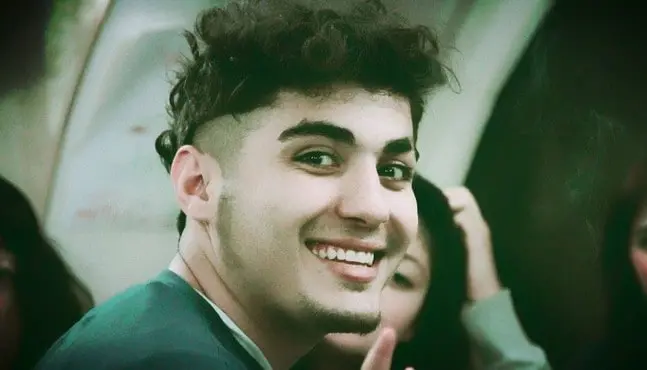As part of PEN America’s The M Word, a series of public programs that provide Muslim writers with a platform to address audiences on their own terms, playwright and The New York Times contributor Wajahat Ali talks with celebrated actor and activist George Takei. They discuss the lessons America has yet to learn from the violence committed against Japanese Americans during World War II and the importance of taking stock of history before plotting an inclusive path forward.
Full Transcript
WAJAHAT ALI: I’m talking to George Takei, actor, activist, author, a man with 2.2 million Twitter followers, 10 million Facebook “likes.” He’s also known to the millennials as the beloved face and voice of Taco Bell commercials with the “Oh, My’s!” and he’s the endearing icon Hikaru Sulu, helmsman of the USS Enterprise.
But, Mr. Takei was also once seen as a “security threat” simply by virtue of being Japanese American. He and his family were interned during World War II courtesy of FDR’s Executive Order 9066, which ultimately interned nearly 120,000 Japanese Americans, uprooting them, disrupting them, and de-humanizing them.
We just recognized the 75th Anniversary of what has been seen as a shameful, dark chapter in U.S. history. Well, until President Trump, who last year cited it as justification for his Muslim ban. He [Donald Trump] said that he’s “no different than FDR,” who he said was “highly respected by all.”
“Take a look at presidential proclamations, what he was doing with Germans, Italians, and Japanese, because he, FDR, had to do it,” Trump said last year.
To discuss the parallels between then and now, the seeds of hope and resistance, and hopefully, if I’m lucky, maybe even some Star Trek talk, here’s George Takei.
ALI: After the election of President Obama, after marriage equality, after so much progress, did you ever think you’d see a 2017 where the internment of your people would be used as a justification for an executive order (the Muslim Ban) to justify the marginalization of another minority?
GEORGE TAKEI: You know, it has been used to justify so many other outrages. We, as Japanese Americans, when 9/11 happened, immediately sensed what would be happening to Muslim Americans as well as Arab Americans. All Arab Americans are not Muslim.
ALI: Right.
TAKEI: So we knew exactly what might be happening to both that ethnic as well as that religious group. I happened to be the Chairman of the Board of the Japanese American Museum at that time. And immediately we knew that we needed to respond as people who had been targeted before. We organized a candlelight ceremony in the plaza of our museum, the Japanese American [National] Museum in Los Angeles, and we invited leaders of the Arab-American community, as well as the Muslim-American community, as well as older Japanese Americans who felt the full sting of our imprisonment. And we held a candlelight ceremony.
Our museum happens to be three blocks from Los Angeles City Hall, so, spontaneously, that candlelight ceremony turned into a candlelight march across downtown—three blocks to City Hall and back again. And because The Los Angeles Times is located across from City Hall, we got a lot of press coverage at that time.
But we knew exactly what would be happening when Donald Trump was campaigning for the Republican nomination. I happened to be doing a musical. We developed it and it was based on the internment of Japanese Americans. During the run of [the musical] Allegiance, Donald Trump made that statement that we need to have a complete and total banning of Muslims coming into the country. I extended a very public invitation to Donald Trump to come see Allegiance, because he could learn something from that history.
He never came.
When Carl Higbie, as a member of that transition team from the Obama Administration to the Trump Administration, tried to use the internment of Japanese Americans as justification, we immediately spoke out on that. So, we recognize what can happen when a tragedy like 9/11 happens to America. Because ours is a people’s democracy. We have noble ideas in our democracy, but it is also a people’s democracy that is as fallible as people are.
As a teenager and all throughout my adult life, I had thought deeply on how a country with the ideals that we have as a people’s democracy can do such a horrific thing as the imprisonment of innocent people—and imprison them with no charges, no due process. There were no charges, so we couldn’t have a trial. You need a charge to challenge, to have a trial, and innocent people were imprisoned. How can that happen, simply because of our ancestry?
My grandparents were the immigrants that came from Japan. My mother was born in Sacramento, California, the capital of the state of California. My father was born in Japan but was brought to San Francisco as a boy and was reared and educated as an American.
And yet we were suddenly overnight looked at with fear and suspicion and outright hatred simply because we happened to look like the people that bombed Pearl Harbor, and we had everything taken away from us. Our home, our businesses, our freedom, and imprisoned for the duration of the war.
How can something like that happen in a people’s democracy? Because the people are fallible human beings, as well as people who can come up with noble ideas.
“Because ours is a people’s democracy. We have noble ideas in our democracy, but it is also a people’s democracy that is as fallible as people are.”
ALI: Well, Mr. Takei, it seems like that’s happening now, again.
TAKEI: It is.
ALI: I was a 20-year-old student leader at UC Berkeley when the two towers fell. I was born and raised in the Bay Area, and the first group that reached out to Muslim-American communities was the Japanese-American communities of the Bay Area. They echoed exactly what you said, that “we have seen this before, we’ve been through this, and we want to help.” That type of solidarity, and that olive branch that was extended, has not been forgotten by many Muslims. In fact, when I told people that I was interviewing you on social media, I asked, “Hey what do you want to ask George Takei?” Most of the Muslims responded, “Just say we want to give him a hug.” So you have a collective hug from so many Muslims, millennials, elders, immigrants, people born and raised here because they really value you being a voice, and a voice of history. Not only a voice of the past but as a voice for the present.
Recently, we celebrated the anniversary of the birth of Fred Korematsu. People forget that Korematsu v. United States in 1944 was a major Supreme Court case. Mr. Korematsu, much like you and your family—Japanese-American, born and raised here—was interned. And it is seen as one of the most shameful Supreme Court rulings in US history because the opinion went against Fred Korematsu and held that the need to protect against espionage outweighed Mr. Korematsu’s individual rights and the rights of Americans of Japanese descent. Here we are in 2017—
TAKEI: —but that was not a pure decision because the Roosevelt administration that argued against Korematsu suppressed vital informations that they had. There was the Ringle Report, the Naval Intelligence Office report, which found—this was before the bombing—that there was no disloyalty, if anything great patriotism, amongst the Japanese-American community. That information was suppressed. In the 70s, I think it was, that Korematsu decision was challenged again all the way up to the federal district court, and Judge [Marilyn Hall] Patel found then that there was fault in the original ruling by the Supreme Court because of the suppression of the information. But they disguised that with Latin. They called it a coram nobis decision, which means “fault in the original ruling.” It was a shameful act on the part of the United States government. They wanted to distance themselves as much as they could, so they put a Latin wrapping over it so that the shame is somewhat muted. It’s scrimmed over—Latin for “fault in the original ruling.”
ALI: And yet that same type of language, Mr. Takei, “security threat,” “we’d rather feel safe than be free,” I see such eerie parallels to 2017 and the justification that the Trump administration and many of his cronies are trying to use for their executive orders. What does it say to you about the current state of America that many Americans are fine with this extreme vetting, perhaps even registry of Muslims, and this type of language being used again? This time not against Japanese Americans, but against Latinos, undocumented, and especially Muslims.
TAKEI: Because of the ignorance on the part of most Americans of their own American history, and particularly that chapter of American history which is shameful. You know, how should I put it …
ALI: Just say it, just say it.
TAKEI: The ignorance of that history is what makes it possible to repeat again. I’m always shocked when I tell people that I consider well-read, well-informed, about my childhood imprisonment. They knew nothing about it. They’re gassed that something like that happened. It’s because we don’t know our history, and sometimes we try to avoid our history that it repeats itself again.
When it happened to Japanese Americans, there was no one that stood for us. Only one elected official, the governor of Colorado, his name is Ralph Carr, said this is wrong, this is unjust, this is unconstitutional, we must not let this happen. For that principled position, his political career was ruined. The only other people that supported us were the very quiet Quakers, and that was dear to us. Even the American Civil Liberties Union, on the national level, took no stand—they were neutral. Only the San Francisco chapter took a strong stand against it. But, because now we have us, the Japanese Americans, and the few people that back in history that recognized this kind of behavior by the government as wrong, we rose up.
The difference today is that immediately after Trump’s executive order banning Muslims for entry into the United States, massive numbers of people rushed to the airports, crowded there. The acting Attorney General [Sally Yates] refused to defend it. And the federal district court judge of Seattle said this is wrong and put a stay on the ruling, which was supported by the Ninth District appellate court.
So the climate is changing, but not enough. When we were doing the musical Allegiance, Donald Trump, whom I know—I did his show and I had the lunch with him advocating for LGBT equality—didn’t respond to that invitation. So we kind of revel in our ignorance, particularly with this president. And that’s why it keeps happening over and over again. What we have to do is to raise the awareness of our American history and as a nation broadly have that understanding as we have an understanding of slavery, which is another shameful chapter of American history that is well known.
We have to raise the awareness, and I think, because of the Japanese American experience, what’s happening to the Muslim-American community is not happening in the same way as it happened to Japanese Americans. I started a petition to express our solidarity with the Muslim-American community. Our goal was a 100,000 signatures. In a month we were able to get 320,000 signatures on that. As a nation now we are becoming more aware and rising up in solidarity to oppose executive orders like Donald Trump’s.
ALI: Just adding on to what you said about ignorance: When I told people on Facebook I was talking to you, a friend posted a question: “How will young people continue to learn about the importance of the Japanese internment camps in schools …”
“The ignorance of that history is what makes it possible to repeat again.”
TAKEI: Please please, not “Japanese internment camps!” Because they were run by the government of Japan. These were Japanese American internment camps, or more precisely U.S. government internment camps in the United States for American citizens of Japanese ancestry. “Japanese internment camps”—that phrase drives me up the wall! Because, just grammatically, Japanese internment camps are run by the government of Japan. That is inaccurate. You want to get the president to change—you know what we need to do to raise the awareness is to change phrases like that …
ALI: Yeah, and you know what, you’re right …
TAKEI: … “Japanese internment camps,” the distancing of culpability.
ALI: … and pardon me, I was reading this person’s direct response.
TAKEI: Oh, I see.
ALI: This is their exact quote, and it probably actually goes right to your point.
TAKEI: And that exhibits the ignorance there.
ALI: Exactly. Because, as this person said, and I’m quoting: “We barely touched upon it on school as is, but I’m concerned that once the generation affected dies, that we’ll have no activist pushing the narrative that I think every American should know about.”
So this person themselves is unintentionally, just like you mentioned, being ignorant in even how we should phrase it, and is admitting that even in school, born and raised in America, they did not receive the proper education of this very shameful chapter in the U.S. history in which 120,000 Americans were interned. I just wanted to mention that.
TAKEI: Exactly. Well, that’s why we work with educational institutions. The Japanese American National Museum in 2004 worked with the University of Arkansas—there were two internment camps in Arkansas. And so we worked in tandem with them. The museum sent five exhibits to Little Rock, Arkansas, and the university developed three exhibits on the two internment camps that were in Arkansas. And we opened that in staggered fashion over the span of a week. Then on Sunday, or on Saturday, we had a huge nationwide symposium there in Little Rock. People came from throughout the country. Then on Sunday, we had a long caravan of buses that went down to the Southeastern Arkansas where the two camps were located and they took pilgrimages there. And then subsequently we invited schoolteachers from the Arkansas educational system to the Japanese American National Museum to spend a month learning about that chapter of American history. They returned to Arkansas to weave the story into their American history books. We need to incorporate that chapter as an organic part of American history from which we need to learn such important lessons.
ALI: Mr. Takei, you gave a TED Talk a few years ago and the title of that talk was “Why I Love a Country that Once Betrayed Me.” After this election and specifically based off the rhetoric and policies of Donald Trump, I’ll just tell you openly that so many of my friends—women, Latinos, Muslims, African Americans—they’re still reeling with anger and pain with the fact that so many Americans were perfectly fine with voting for a man who called Mexicans rapists and criminals, who was fine with the wall, who was bragging about grabbing 51 percent of the population by certain body parts, the Muslim ban, and so forth. And they’re saying, “How can I love those Americans who betrayed me and threw me under the bus in order to feel great again?” How would you respond to that?
TAKEI: We need to have those people learn what American democracy truly is. It really is our democracy. It’s because of the lack of participation. I know more than a few young people who say, “I’m only one vote. It’s millions of Americans and I don’t count.” Or the voter participation, which is improving now, from the Latino community has been historically low. We need to improve the voter participation in a people’s democracy. Without the people participating in a people’s democracy, people that are informed who cast informed votes, our people’s democracy is in jeopardy.
And that’s why from the time I was in my late teens, I’ve been an active participant in a participatory democracy. I was a volunteer in the Adlai Stevenson for President campaign headquarters when I didn’t have the vote yet. Before I could even register to vote, I was actively involved. The vote is important.
Also, the election of Donald Trump is the best argument for getting rid of the Electoral College. I used to support the Electoral College, because when this nation was founded, it was founded during the Pony Express age. Information got out to the hinterlands by Pony Express. And so we needed the electoral college to have people who were informed to make the final vote on the important issues or the election of our representatives. But, in this day and age, when information is instantaneous and global, we don’t need the Electoral College system anymore. Donald Trump’s election is the best argument we have for getting rid of that system. But the other important thing is voter registration and developing informed voters. This is an essential, existential necessity in a people’s democracy.
ALI: Especially in the age of fake news and alternative facts, and massacres that didn’t happen in Bowling Green and Sweden, and when you have the President of the United States …
TAKEI: And New Jersey … [Chuckles] … celebrations that didn’t happen.
ALI: Ah yes, yes—the Muslims allegedly who celebrated the falling of the two towers and the videotape is only seen by Donald Trump. Probably given to him by the same source who claimed that President Obama was not born in America. But I digress, I digress. We live in interesting times.
TAKEI: No, no, that’s not a digression. Because that is the dark side of this instantaneous information that we have now. You know, social media has both the positive and the negative. And that’s why we need to have people that are informed, savvy enough to recognize or savvy enough to get the truth when there’s such a morass of information available.
ALI: Speaking about literacy, historical literacy, also digital literacy, you touch upon with so many people using and abusing social media, but there’s also a cultural literacy. And at the very least, at least last night, Moonlight wins Best Picture, Iranians win Oscars, gay people win Oscars, Muslims win Oscars, black people win Oscars, white folks win Oscars, and, for a night it seems, at least in pop culture, America was great again. What’s your response to the victory of Moonlight and what it means? And also, growing up—I’m now 36—Sulu for us, and I’m Pakistani-American, but for many Asian Americans, Sulu was so symbolic of the fact that he was on the USS Enterprise. What we always said was, “Sulu should have never been a sidekick. Sulu should have been the captain.” I know he was eventually in the movies …
TAKEI: I eventually became the captain …
ALI: … eventually in the movie Star Trek VI: The Undiscovered Country.
TAKEI: And it takes a lot of lobbying and activism [laughs].
ALI: I’m turning this into a figurative and literal question. How can so many people of color/minorities make sure that we can become the captains of our own pop cultural narratives? Is the time now that we will no longer be just sidekicks but will be captains?
TAKEI: I think it’s important. Just last year we had the second year of #OscarsSoWhite, and then this year, we have Moonlight getting the Best Picture Award and we have Viola Davis, a stunning, rich actress, becoming the Best Supporting Actress. And Mahershala Ali as the Best Supporting Actor. So, you know, we have a dramatic change happening; however, our media should not be just black and white. Black and white movies are history from before. Now we have color and we need to have all the hues of the American diversity on screen from brown to yellow to red—the whole spectrum—and that we did not see last night. It was a black and white movie that we saw. We made progress, but we need to make much, much more, and that’s why I’m giving voice to that. We need to keep ourselves informed. We need to be aware of the progress we’re making but also be mindful of the progress we need to make in order to become a much more representative society. You know, on Star Trek, we had a motto, “Infinite diversity and infinite combinations.” We just saw the black and white combination yesterday.
“Black and white movies are history from before. Now we have color and we need to have all the hues of the American diversity on screen from brown to yellow to red—the whole spectrum …”
ALI: And last year, you mentioned #OscarsSoWhite, many Asian Americans in particular said the jokes are still at their expense. You know, those three [Asian-American] kids were brought last year. Even Jimmy Kimmel kept making these somewhat asinine jokes about names like Mahershala and Yulree, this Asian-American woman who came and he was like “What type of name is Yulree?” And Mahershala, Yulree, Dev Patel, these are nice, normal names, but it seems like even last night, even with all this victory, these “ethnic” names were easy jokes.
TAKEI: Well, you know, we still have a long ways to go, a long ways to go, but we are on the way. And sometimes there are going to be, you know, a couple of steps backward, too, as we are getting in Washington, but in Hollywood we are moving forward.
ALI: Final question. Another watershed, if you will, cultural crisis moment right now is the inclusion or exclusion of transgender kids. And as a LGBTQ activist, you have been very vocal speaking about some of the fissures. How do you defend or explain the analogy of the water fountain of the past to the bathroom of today for those people of color, fellow minorities, who are not willing to jump on the bandwagon to defend transgender rights?
TAKEI: Yes, it’s the same thing. It’s the same issue there. You know, this is a made up issue by politicians who had hate behind them. If a person looks like a girl, dresses like a girl, and acts like a girl, imagine her moving into the boy’s room. You know what’s going to happen just on the surface. She’s going to be insulted, vilified, and attacked. It’s an obvious situation created by ignorant and hateful politicians just so that they can remain in office. Donald Trump himself said Caitlyn Jenner is welcome to use his ladies’ room in Trump Tower, and now he’s gone against his campaign promises. He likes to say he’s been keeping his campaign promises. Well some of the campaign promises of his that I agreed with—I didn’t applaud because it shows the kind of patronizing tone but, nevertheless, you know, he showed some enlightenment—and yet, he lets a person like Jeff Sessions, who has a whole history, his own life history is one of segregation, voter suppression, segregated education, and now he’s, of all things, the Secretary of the Department of Justice.
ALI: Right, Attorney General.
TAKEI: … Attorney General of the United States. It’s shameful, but these are the major steps backward we’re making, and this has galvanized all of us who are determined to move America forward to a better democracy and a truer democracy.
ALI: George Takei, thank you so much for your time. Actor, activist, author, social media king. You can follow him @GeorgeTakei. He will sell you also Taco Bell treats and …
TAKEI: [laughs] … as well as Pizza Hut.
ALI: Oh yeah, sorry, couldn’t forget Pizza Hut. He will sell you tacos and pizza and he remains fit. Somehow he eats both and he’s still healthy. And of course …
TAKEI: You got to exercise, you know. You can take in but you also got to burn up.
ALI: See, it’s wisdom, this is wisdom. And this is wisdom of Hikaru Sulu who became the captain of the USS Enterprise. And right now he’s the captain of many Americans who feel ignored and silenced. So, thank you on behalf of all of us and thank you for taking the time for this conversation, Sir.
TAKEI: It’s my pleasure. Good talking with you.
The M Word is a two-year series of public events launched in September 2016 to provide a platform for Muslim-American writers and cultural figures to address audiences on their own terms—highlighting the art forms, narratives, and identities that influence their work—and to challenge the prevailing narrow representations of highly diverse Muslim communities comprised of more than three million Americans. The M Word is supported by the Doris Duke Foundation for Islamic Art’s Building Bridges program.

